
cline-based-code-generator
VS Code extension that streamlines development workflows through AI-powered task execution, intelligent file management, and automated code generation. Built on Cline, it integrates with various LLMs to enhance productivity and code quality while simplifying complex development tasks.
Stars: 62
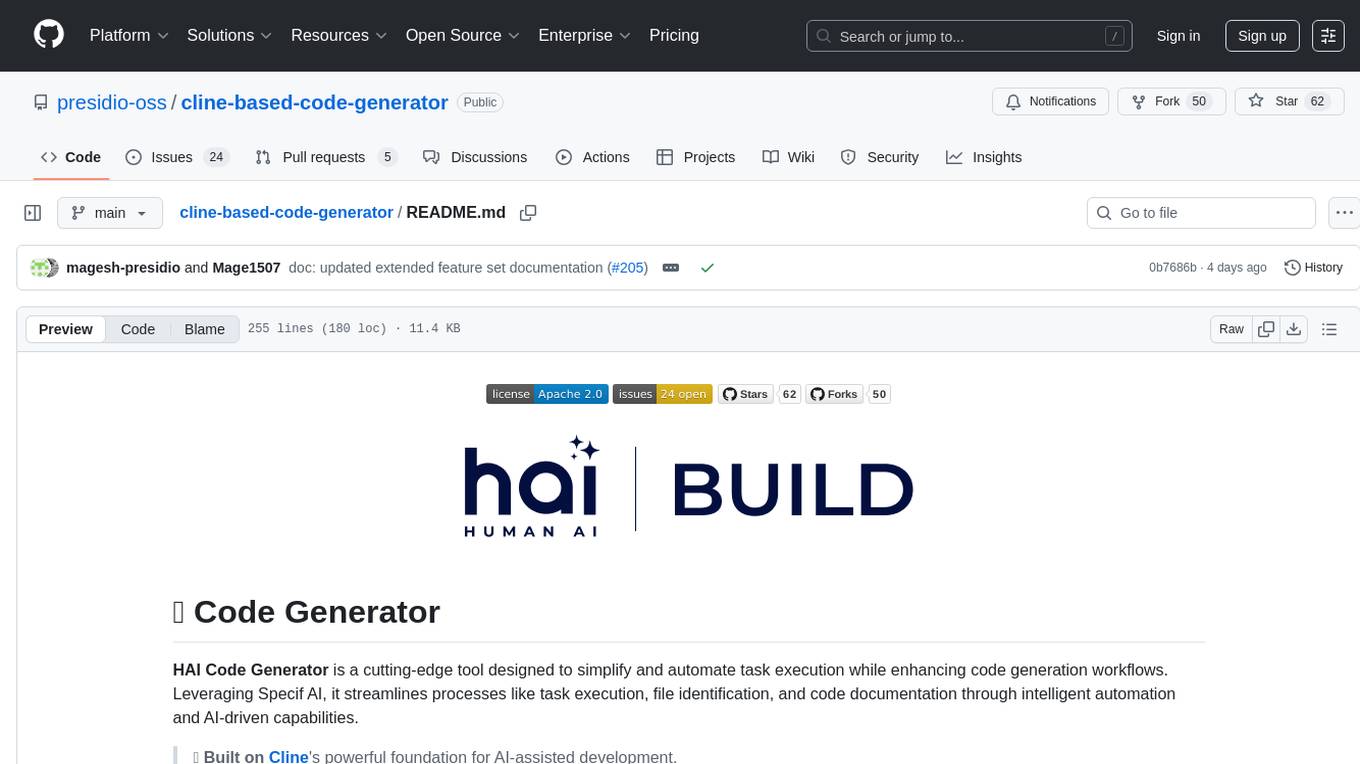
HAI Code Generator is a cutting-edge tool designed to simplify and automate task execution while enhancing code generation workflows. Leveraging Specif AI, it streamlines processes like task execution, file identification, and code documentation through intelligent automation and AI-driven capabilities. Built on Cline's powerful foundation for AI-assisted development, HAI Code Generator boosts productivity and precision by automating task execution and integrating file management capabilities. It combines intelligent file indexing, context generation, and LLM-driven automation to minimize manual effort and ensure task accuracy. Perfect for developers and teams aiming to enhance their workflows.
README:
HAI Code Generator is a cutting-edge tool designed to simplify and automate task execution while enhancing code generation workflows. Leveraging Specif AI, it streamlines processes like task execution, file identification, and code documentation through intelligent automation and AI-driven capabilities.
🏗️ Built on Cline's powerful foundation for AI-assisted development.
- 🧑💻 Experts : Context-aware code generation with built-in and custom domain experts
- ✏️ Inline Editing : Make quick, AI-assisted edits without leaving your codebase
- 📝 HAI Tasks : Integrate AI-generated user stories and tasks seamlessly into your workflow
- 🔍 File Identification : Discover and contextualize code files with intelligent indexing
- ⚙️ Settings Interface : Easily configure LLMs and embedding models for tailored performance
- 📊 COR-Matrix Integration : Track AI code retention patterns and analyze code origin over time
HAI Code Generator is designed to boost productivity and precision by automating task execution and integrating file management capabilities. It combines intelligent file indexing, context generation, and LLM-driven automation to minimize manual effort and ensure task accuracy. With user-friendly interfaces and configurable settings, HAI Code Generator is perfect for both developers and teams aiming to enhance their workflows.
- Open Visual Studio Code → Extensions (⇧⌘X) → Search for “HAI Build” → Click Install
- Upon installation, the HAI extension can be found in the sidebar.
The Experts feature enables HAI Code Generator to deliver context-aware code generation tailored to specific technologies or domains.
- Four built-in experts are available: .NET, Terraform, Node.js, and Go.
- Each provides predefined guidelines and best practices in read-only mode for quick reference.
- Users can create custom experts to define their own guidelines and (optionally) attach up to three reference document links.
- Custom experts are stored in the
.hai-expertsfolder under a subfolder named after the expert. - Each expert folder contains:
-
metadata.json: Stores expert name, creation date, and any document links. -
prompt.md: Contains the expert’s guidelines (required).
-
- If document links are provided, a
docsfolder is created with:- Markdown files for each processed document.
-
status.jsonto track processing status.
Note:
- Expert name and guidelines are mandatory when creating a custom expert.
- Document links are optional and can be added for richer context.
This feature allows you to extend HAI Code Generator’s knowledge with your own standards, best practices, and documentation—ensuring more accurate and relevant code generation for your unique stack.
Enhance your code editing experience with inline editing, allowing you to make changes directly within the codebase.
- Click "Edit with hAI" and provide a brief prompt to effortlessly transform selected code.
- Perfect for quick edits or corrections without navigating away from your codebase.
Harness the power of AI for seamless task management and user-story execution, HAI Code Generator integrates tasks generated by Specif AI, allowing them to be loaded directly into the HAI Tasks page. This streamlined process enables you to:
- Review AI-generated tasks within a dedicated interface.
- Execute them instantly with a single click.
- Manage all tasks in one place for improved clarity and productivity.
By centralizing AI-driven tasks in HAI Code Generator, you can maintain an efficient workflow from ideation to execution.
-
In-Depth Story Review
- View a story in detail by clicking the Eye icon, along with the corresponding list of tasks, providing comprehensive insights into objectives, prerequisites, and outcomes.
-
In-Depth Task Review
- Similar to user stories, tasks can be viewed in detail and executed directly from the same interface.
Enhanced file identification with intelligent discovery and retrieval:
Transform the way you manage files by leveraging the core functionalities of Task-Based File Discovery, supported by advanced components like contextual code comments and indexing.
-
Contextual Code Comments
- Automatically generate contextual comments for every identified file, offering deeper insights and clarifications.
- Store all generated comments in a dedicated folder, ensuring they are easily accessible without cluttering your codebase.
-
Faiss DB Indexing
- Built on the robust vector-search engine, Faiss DB ensures real-time and highly accurate file indexing, enabling instant discovery of relevant files.
- Handles large repositories effortlessly, ensuring HAI Code Generator scales with your project's needs.
Together, these components form a cohesive system for efficient file identification, ensuring that Task-Based File Discovery is not just smart but also contextual.
Customize and seamlessly integrate advanced language and embedding models into your AI-powered workflow, ensuring you stay at the forefront of AI innovations.
-
LLM Configuration
- Seamlessly integrate and switch between various language models, ensuring compatibility with the latest AI advancements. Supported models include OpenRouter, Anthropic, Google Gemini, GCP Vertex AI, AWS Bedrock, OpenAI, OpenAI-Compatible models, LM Studio, and Ollama.
-
Embedding Configuration
- Effortlessly configure and switch between supported embedding models, ensuring flexibility and adaptability for different use cases. Compatible embedding models include OpenAI-Compatible, OpenAI, and AWS Bedrock.
Track AI code retention patterns and analyze how much AI-generated code remains in your codebase over time.
- Code Origin Tracking: Monitor AI-generated code longevity and evolution patterns
- Privacy-First: Only cryptographic hashes are transmitted, your code stays local
- Optional Integration: Activate through workspace configuration when needed
- Zero Performance Impact: Background processing with graceful degradation
For detailed setup and configuration, see our COR-Matrix Integration Guide.
Configure external telemetry settings to monitor and analyze your AI-powered development workflows with environment-specific customization capabilities.
-
External Configuration Override
- Support for telemetry configuration overrides via a
.hai.configfile placed at the root of your workspace. - Enables environment-specific customization that can be dynamically injected through CI/CD pipelines.
- Support for telemetry configuration overrides via a
-
Supported Override Parameters
# Langfuse Configuration langfuse.apiUrl= langfuse.apiKey= langfuse.publicKey= # PostHog Configuration posthog.url= posthog.apiKey=
Important Notes:
- The
.hai.configfile is not git-excluded by default. Ensure sensitive keys are not committed unintentionally to your repository.
For comprehensive documentation and in-depth guides on HAI Code Generator features, visit our Wiki.
To contribute to the project, start by exploring open issues or checking our feature request board.
To get started with HAI Code Generator, follow these steps:
Local Development Instructions
-
Clone the repository (Requires git-lfs):
git clone https://github.com/presidio-oss/cline-based-code-generator
-
Open the project in VSCode:
code cline-based-code-generator
-
Install the necessary dependencies for the extension and webview-gui:
npm run install:all
-
Launch by pressing F5 (or Run -> Start Debugging) to open a new VSCode window with the extension loaded. (You may need to install the esbuild problem matchers extension if you run into issues building the project.)
Please read our Contributing Guidelines for more details.
This project is licensed under the Apache 2.0 License. See the LICENSE file for more details.
Thanks to all contributors and users for their support and feedback.
For any questions or feedback, please contact us at [email protected].
For Tasks:
Click tags to check more tools for each tasksFor Jobs:
Alternative AI tools for cline-based-code-generator
Similar Open Source Tools

cline-based-code-generator
HAI Code Generator is a cutting-edge tool designed to simplify and automate task execution while enhancing code generation workflows. Leveraging Specif AI, it streamlines processes like task execution, file identification, and code documentation through intelligent automation and AI-driven capabilities. Built on Cline's powerful foundation for AI-assisted development, HAI Code Generator boosts productivity and precision by automating task execution and integrating file management capabilities. It combines intelligent file indexing, context generation, and LLM-driven automation to minimize manual effort and ensure task accuracy. Perfect for developers and teams aiming to enhance their workflows.
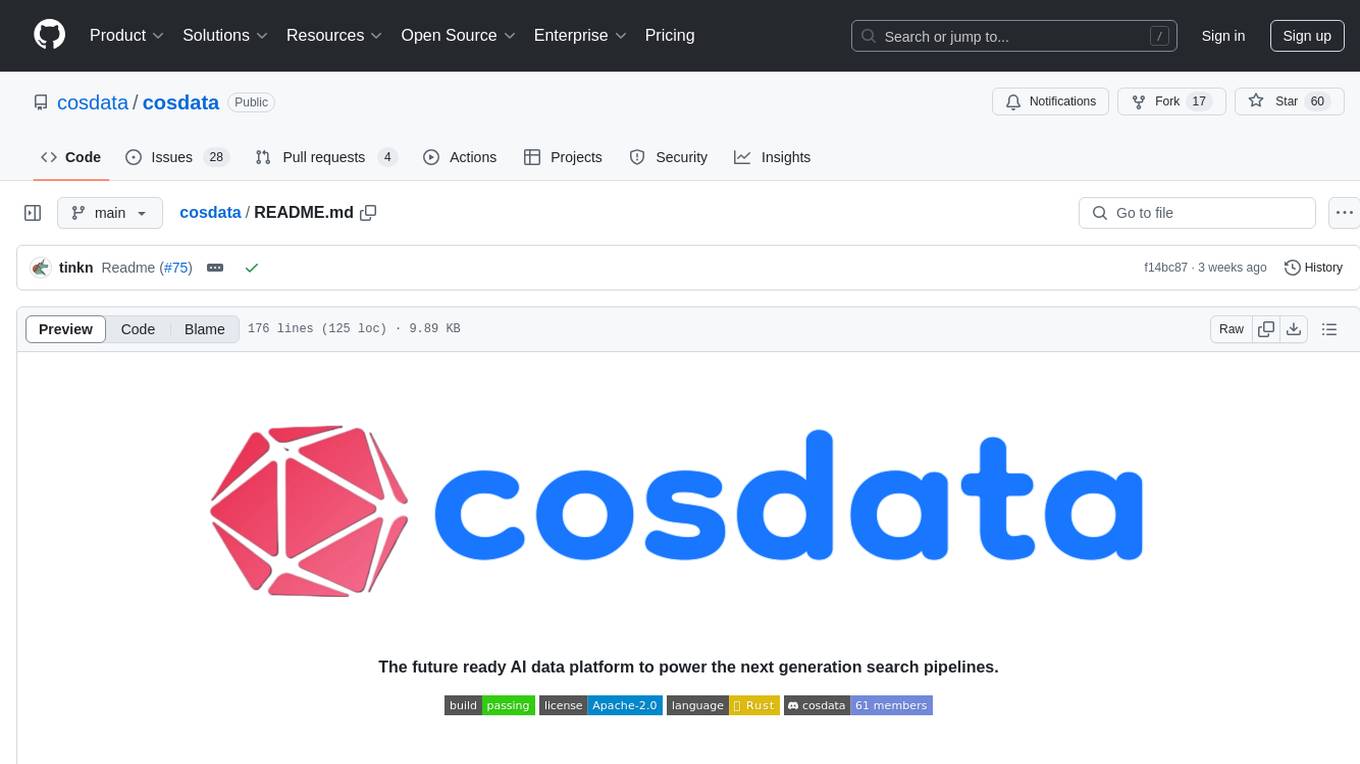
cosdata
Cosdata is a cutting-edge AI data platform designed to power the next generation search pipelines. It features immutability, version control, and excels in semantic search, structured knowledge graphs, hybrid search capabilities, real-time search at scale, and ML pipeline integration. The platform is customizable, scalable, efficient, enterprise-grade, easy to use, and can manage multi-modal data. It offers high performance, indexing, low latency, and high requests per second. Cosdata is designed to meet the demands of modern search applications, empowering businesses to harness the full potential of their data.

swark
Swark is a VS Code extension that automatically generates architecture diagrams from code using large language models (LLMs). It is directly integrated with GitHub Copilot, requires no authentication or API key, and supports all languages. Swark helps users learn new codebases, review AI-generated code, improve documentation, understand legacy code, spot design flaws, and gain test coverage insights. It saves output in a 'swark-output' folder with diagram and log files. Source code is only shared with GitHub Copilot for privacy. The extension settings allow customization for file reading, file extensions, exclusion patterns, and language model selection. Swark is open source under the GNU Affero General Public License v3.0.
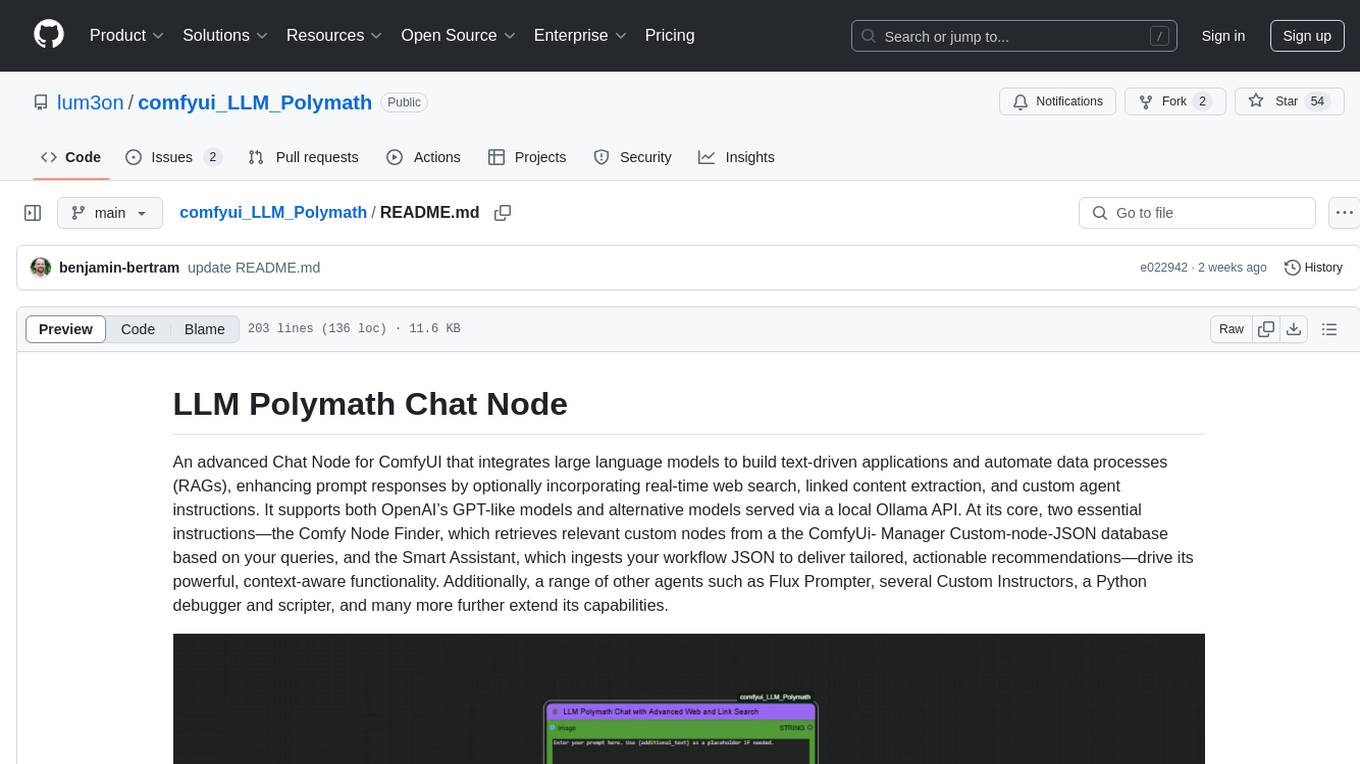
comfyui_LLM_Polymath
LLM Polymath Chat Node is an advanced Chat Node for ComfyUI that integrates large language models to build text-driven applications and automate data processes, enhancing prompt responses by incorporating real-time web search, linked content extraction, and custom agent instructions. It supports both OpenAI’s GPT-like models and alternative models served via a local Ollama API. The core functionalities include Comfy Node Finder and Smart Assistant, along with additional agents like Flux Prompter, Custom Instructors, Python debugger, and scripter. The tool offers features for prompt processing, web search integration, model & API integration, custom instructions, image handling, logging & debugging, output compression, and more.
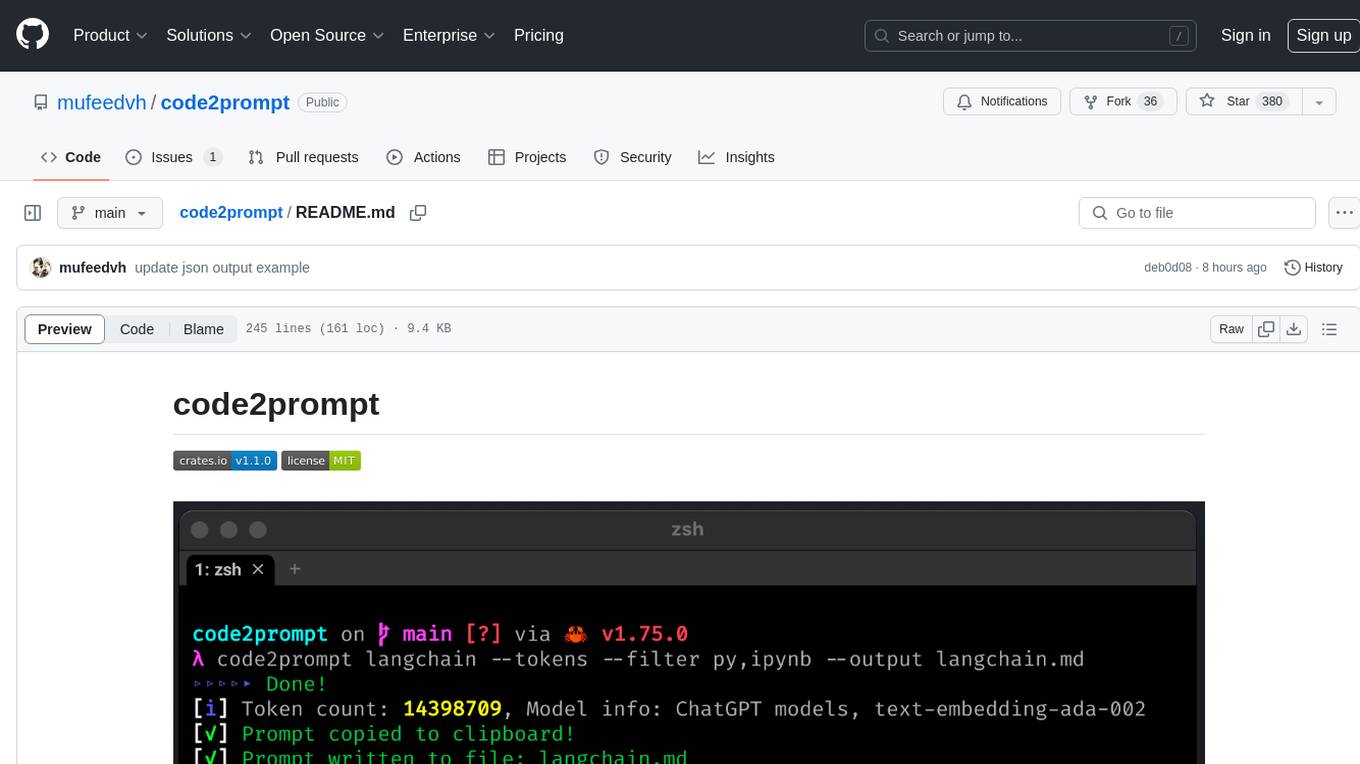
code2prompt
code2prompt is a command-line tool that converts your codebase into a single LLM prompt with a source tree, prompt templating, and token counting. It automates generating LLM prompts from codebases of any size, customizing prompt generation with Handlebars templates, respecting .gitignore, filtering and excluding files using glob patterns, displaying token count, including Git diff output, copying prompt to clipboard, saving prompt to an output file, excluding files and folders, adding line numbers to source code blocks, and more. It helps streamline the process of creating LLM prompts for code analysis, generation, and other tasks.
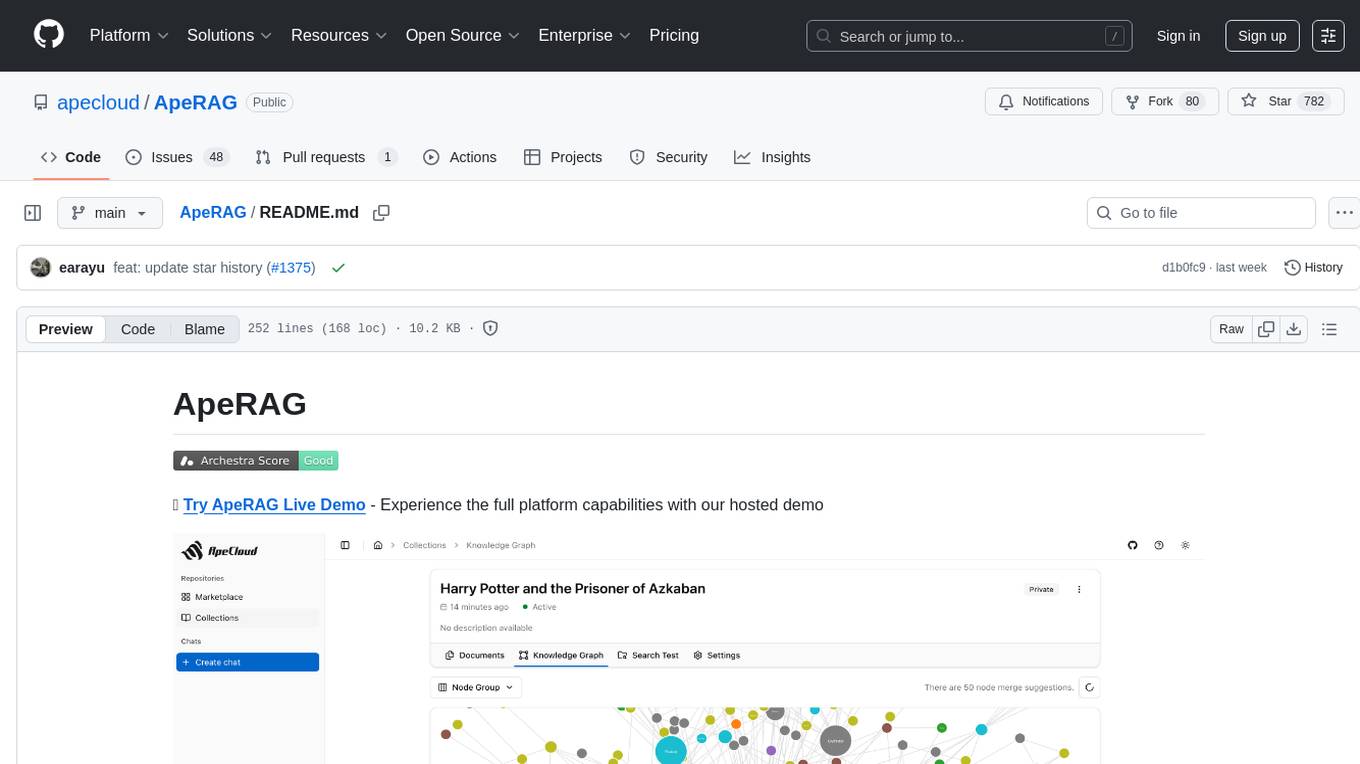
ApeRAG
ApeRAG is a production-ready platform for Retrieval-Augmented Generation (RAG) that combines Graph RAG, vector search, and full-text search with advanced AI agents. It is ideal for building Knowledge Graphs, Context Engineering, and deploying intelligent AI agents for autonomous search and reasoning across knowledge bases. The platform offers features like advanced index types, intelligent AI agents with MCP support, enhanced Graph RAG with entity normalization, multimodal processing, hybrid retrieval engine, MinerU integration for document parsing, production-grade deployment with Kubernetes, enterprise management features, MCP integration, and developer-friendly tools for customization and contribution.
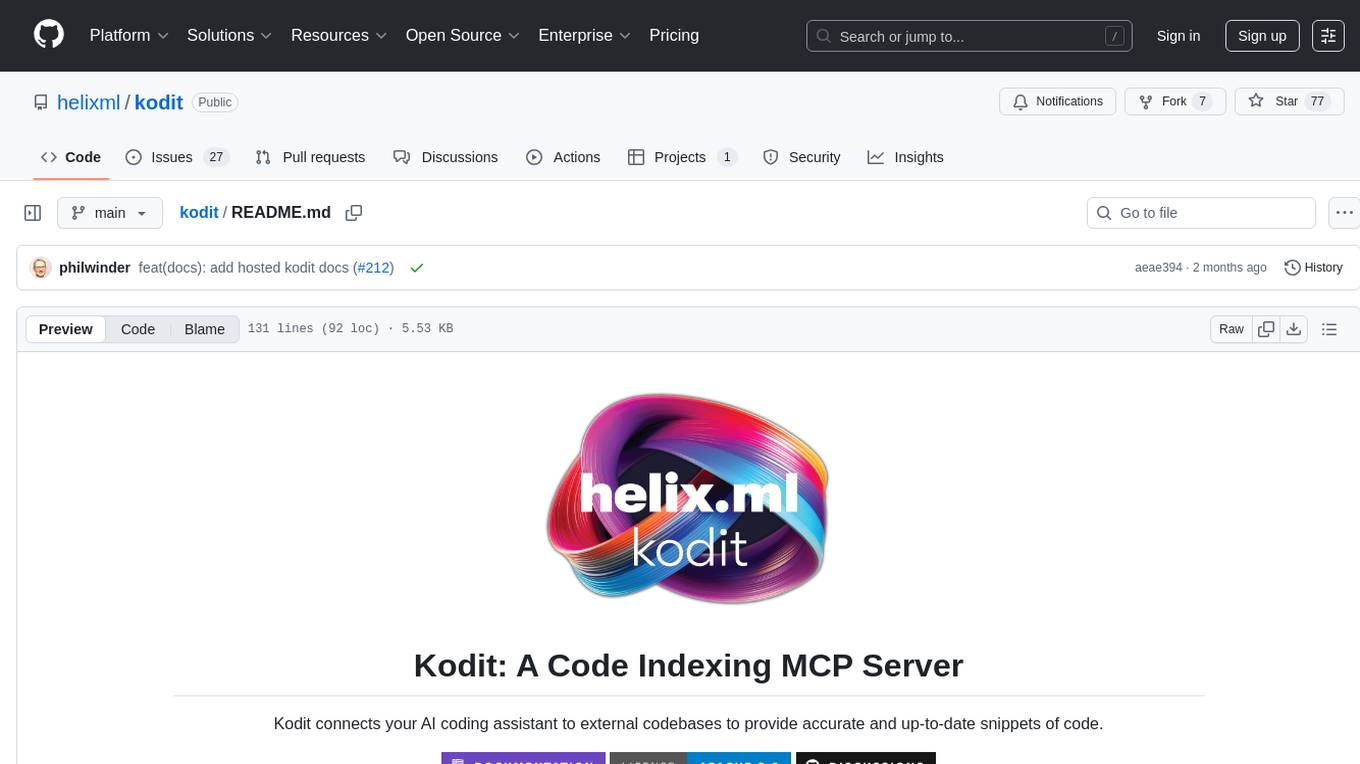
kodit
Kodit is a Code Indexing MCP Server that connects AI coding assistants to external codebases, providing accurate and up-to-date code snippets. It improves AI-assisted coding by offering canonical examples, indexing local and public codebases, integrating with AI coding assistants, enabling keyword and semantic search, and supporting OpenAI-compatible or custom APIs/models. Kodit helps engineers working with AI-powered coding assistants by providing relevant examples to reduce errors and hallucinations.
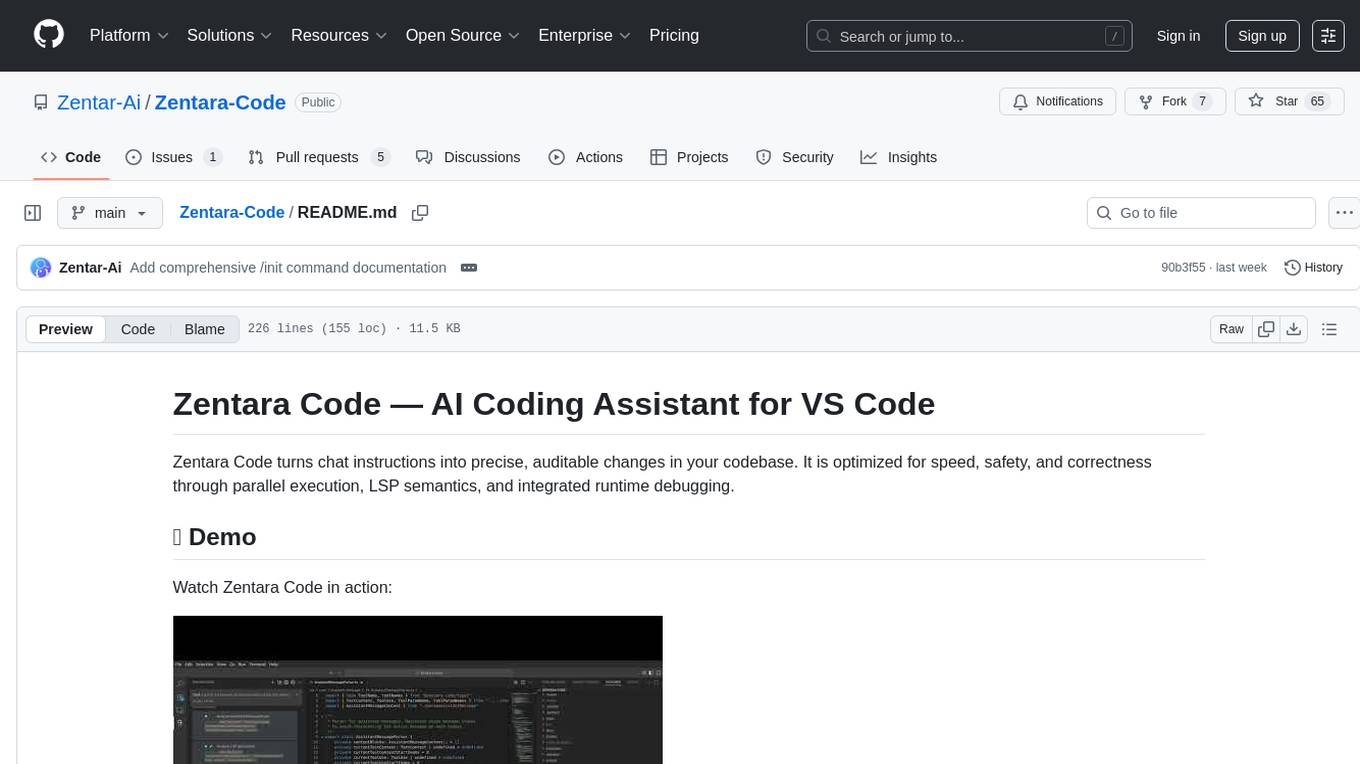
Zentara-Code
Zentara Code is an AI coding assistant for VS Code that turns chat instructions into precise, auditable changes in the codebase. It is optimized for speed, safety, and correctness through parallel execution, LSP semantics, and integrated runtime debugging. It offers features like parallel subagents, integrated LSP tools, and runtime debugging for efficient code modification and analysis.
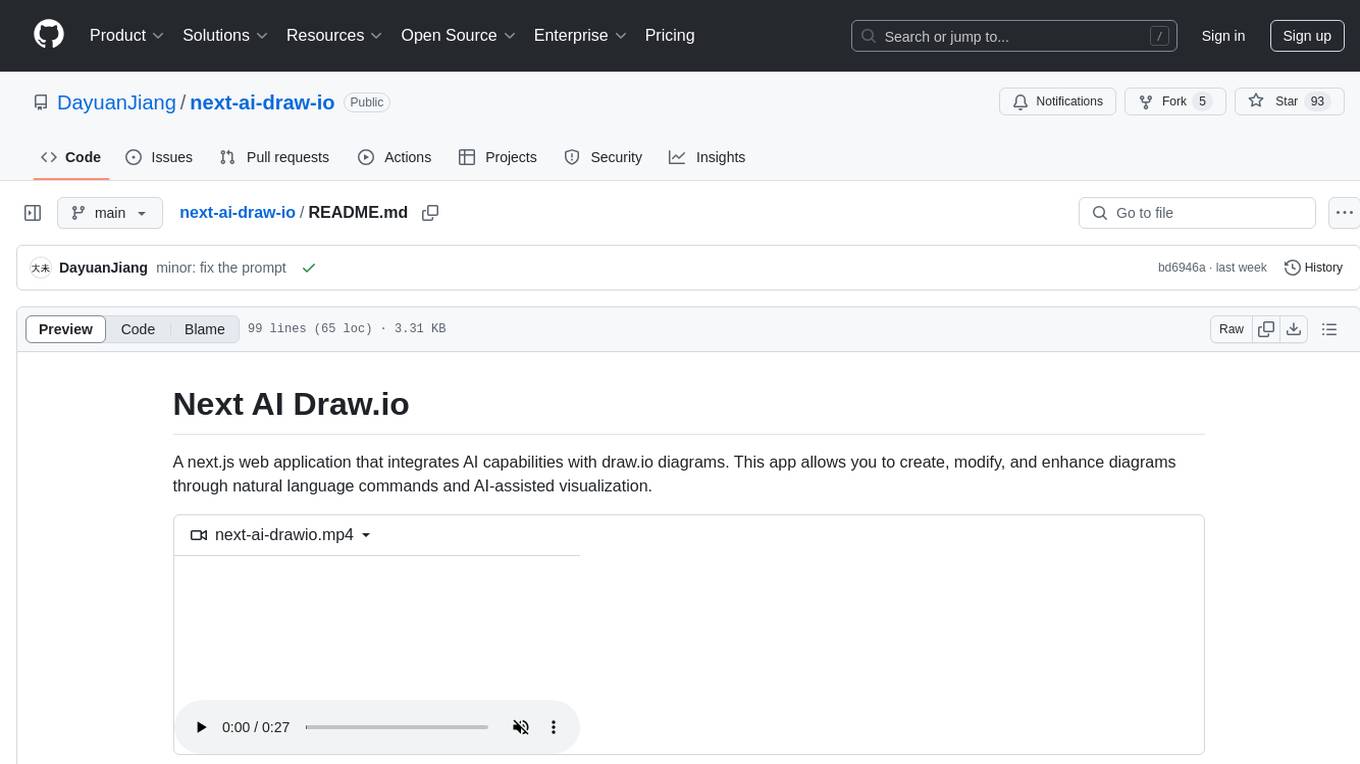
next-ai-draw-io
Next AI Draw.io is a next.js web application that integrates AI capabilities with draw.io diagrams. It allows users to create, modify, and enhance diagrams through natural language commands and AI-assisted visualization. Features include LLM-Powered Diagram Creation, Image-Based Diagram Replication, Diagram History, Interactive Chat Interface, and Smart Editing. The application uses Next.js for frontend framework, @ai-sdk/react for chat interface and AI interactions, and react-drawio for diagram representation and manipulation. Diagrams are represented as XML that can be rendered in draw.io, with AI processing commands to generate or modify the XML accordingly.
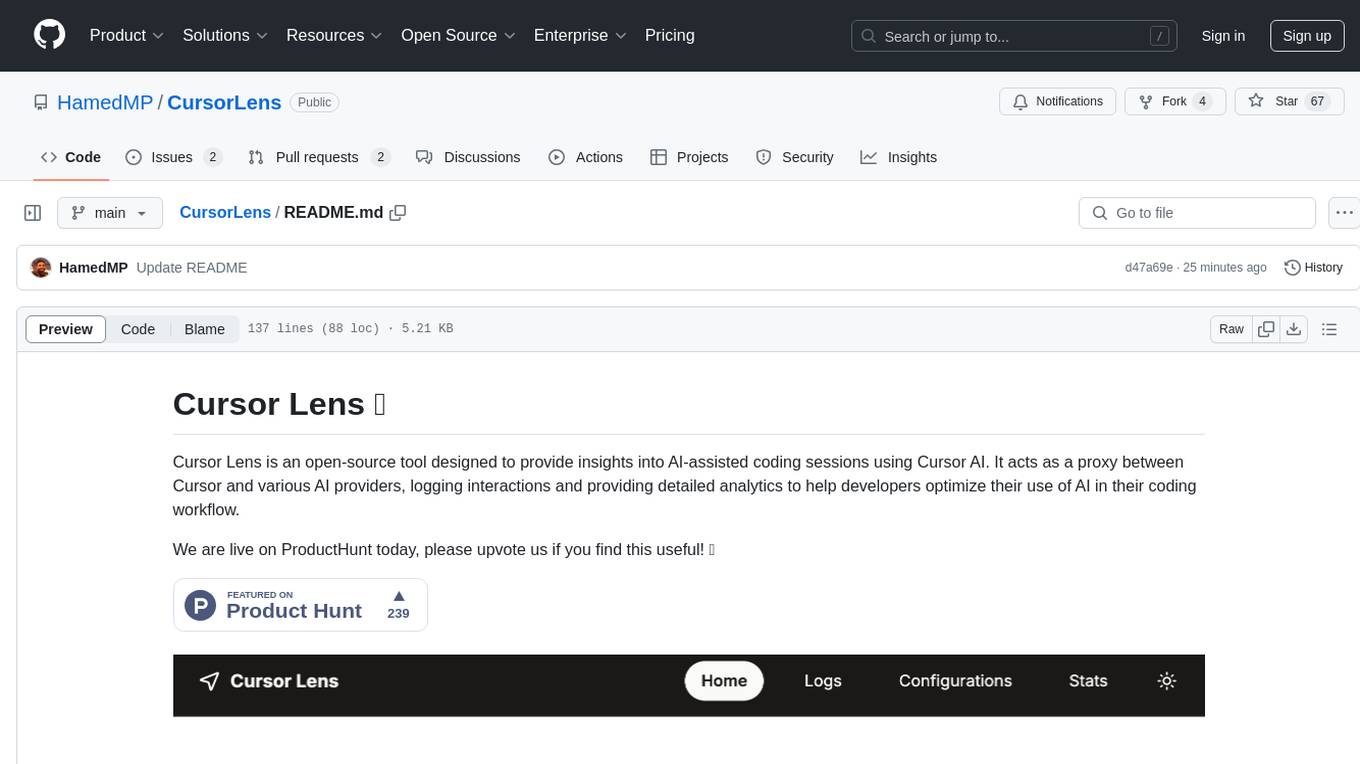
CursorLens
Cursor Lens is an open-source tool that acts as a proxy between Cursor and various AI providers, logging interactions and providing detailed analytics to help developers optimize their use of AI in their coding workflow. It supports multiple AI providers, captures and logs all requests, provides visual analytics on AI usage, allows users to set up and switch between different AI configurations, offers real-time monitoring of AI interactions, tracks token usage, estimates costs based on token usage and model pricing. Built with Next.js, React, PostgreSQL, Prisma ORM, Vercel AI SDK, Tailwind CSS, and shadcn/ui components.
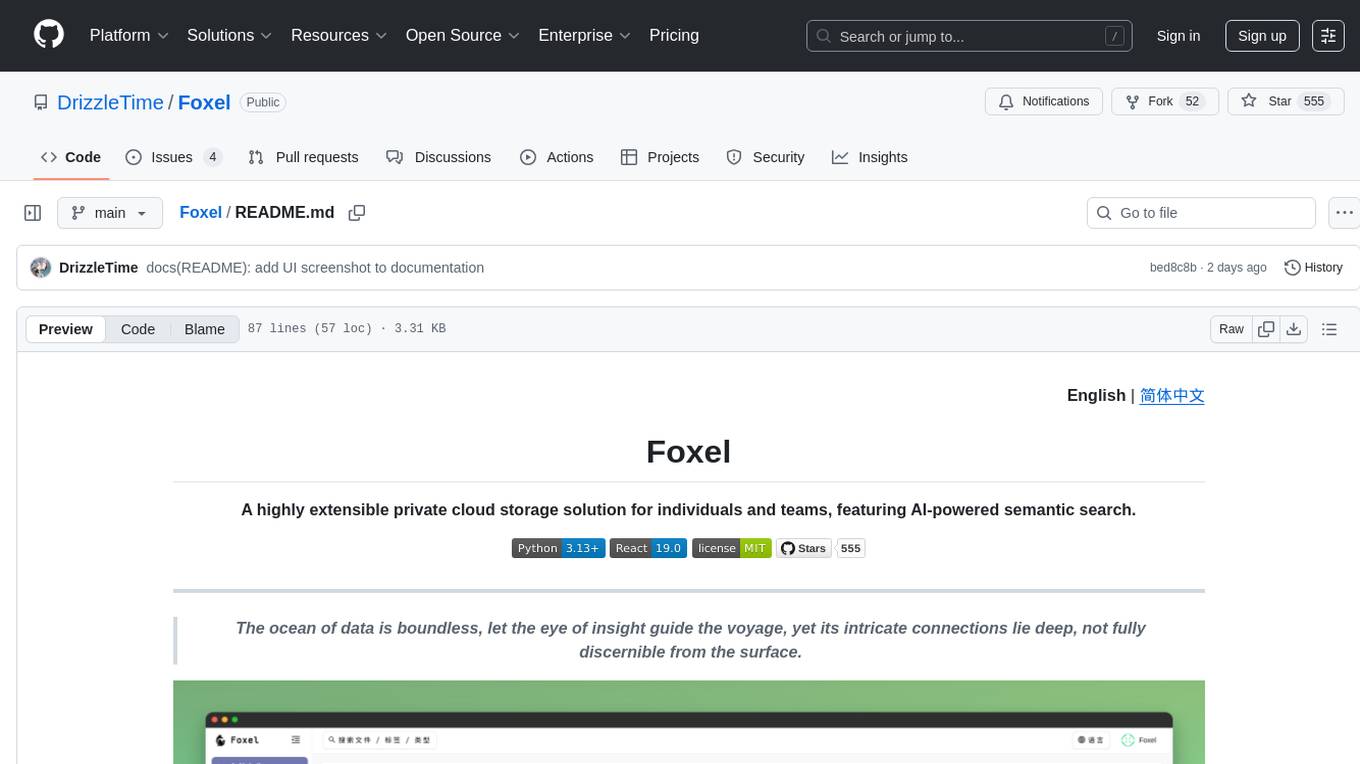
Foxel
Foxel is a highly extensible private cloud storage solution for individuals and teams, featuring AI-powered semantic search. It offers unified file management, pluggable storage backends, semantic search capabilities, built-in file preview, permissions and sharing options, and a task processing center. Users can easily manage files, search content within unstructured data, preview various file types, share files, and process tasks asynchronously. Foxel is designed to centralize file management and enhance search capabilities for users.
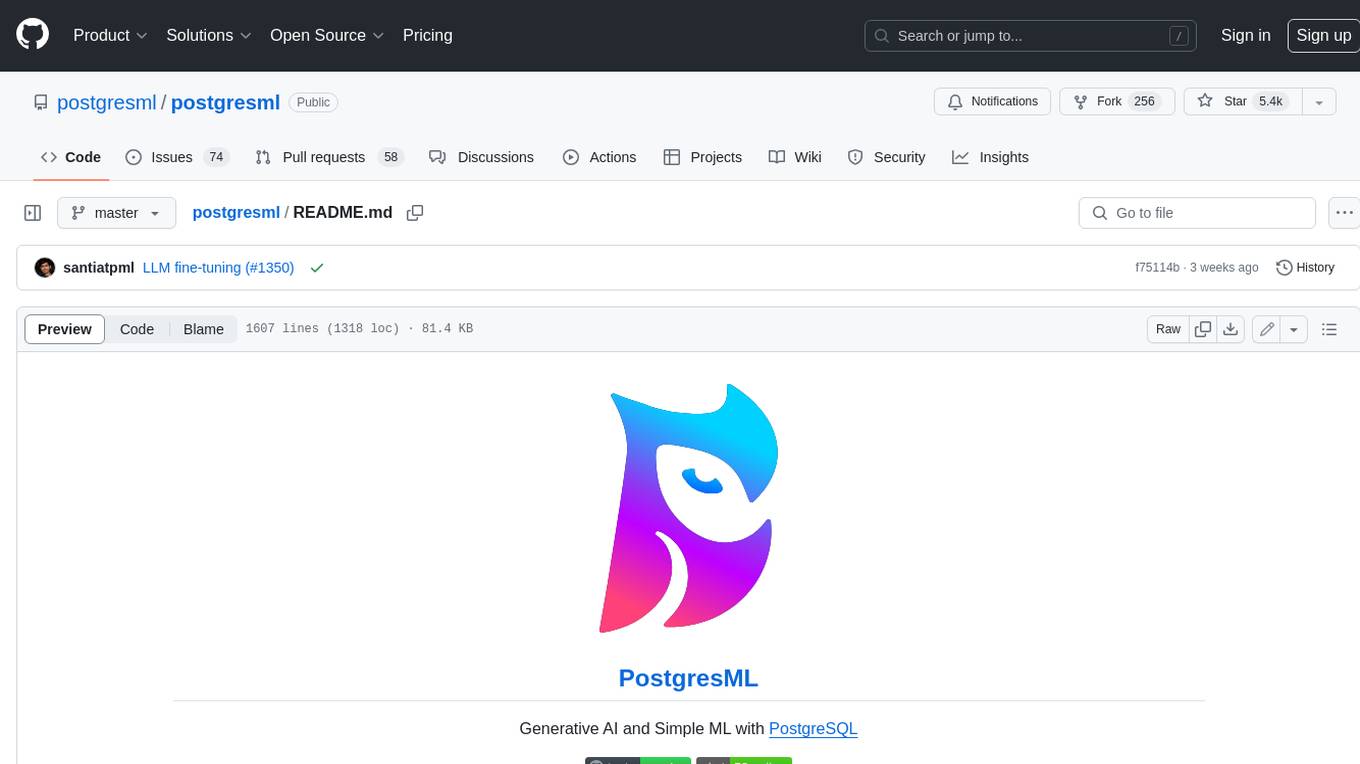
postgresml
PostgresML is a powerful Postgres extension that seamlessly combines data storage and machine learning inference within your database. It enables running machine learning and AI operations directly within PostgreSQL, leveraging GPU acceleration for faster computations, integrating state-of-the-art large language models, providing built-in functions for text processing, enabling efficient similarity search, offering diverse ML algorithms, ensuring high performance, scalability, and security, supporting a wide range of NLP tasks, and seamlessly integrating with existing PostgreSQL tools and client libraries.
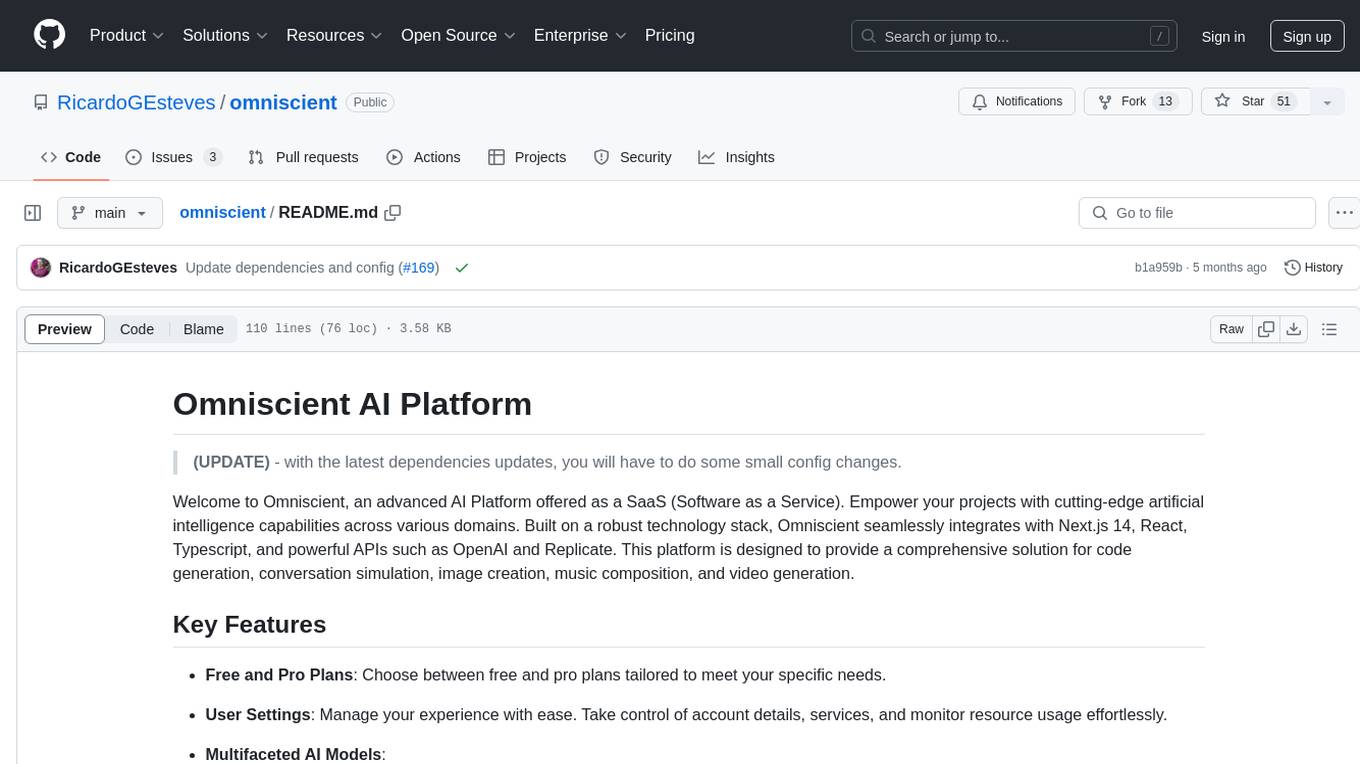
omniscient
Omniscient is an advanced AI Platform offered as a SaaS, empowering projects with cutting-edge artificial intelligence capabilities. Seamlessly integrating with Next.js 14, React, Typescript, and APIs like OpenAI and Replicate, it provides solutions for code generation, conversation simulation, image creation, music composition, and video generation.
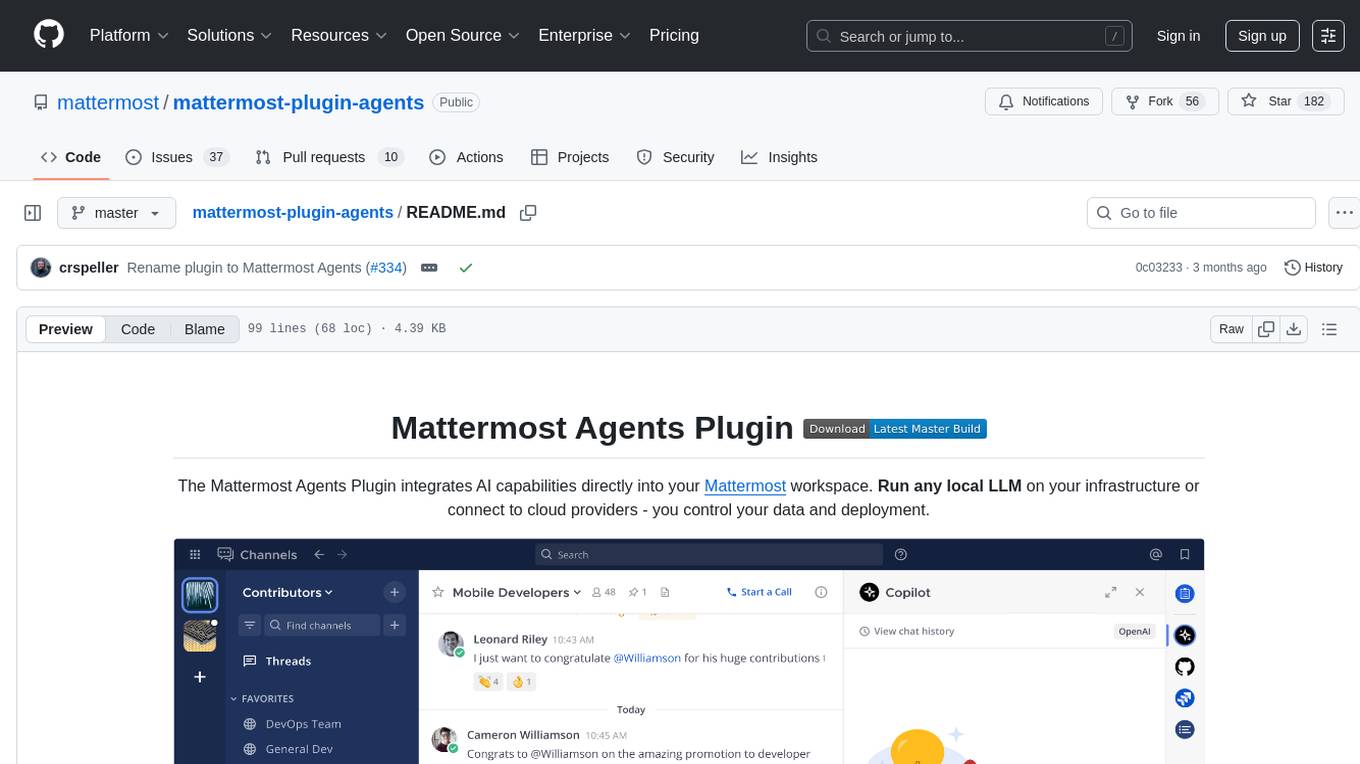
mattermost-plugin-agents
The Mattermost Agents Plugin integrates AI capabilities directly into your Mattermost workspace, allowing users to run local LLMs on their infrastructure or connect to cloud providers. It offers multiple AI assistants with specialized personalities, thread and channel summarization, action item extraction, meeting transcription, semantic search, smart reactions, direct conversations with AI assistants, and flexible LLM support. The plugin comes with comprehensive documentation, installation instructions, system requirements, and development guidelines for users to interact with AI features and configure LLM providers.
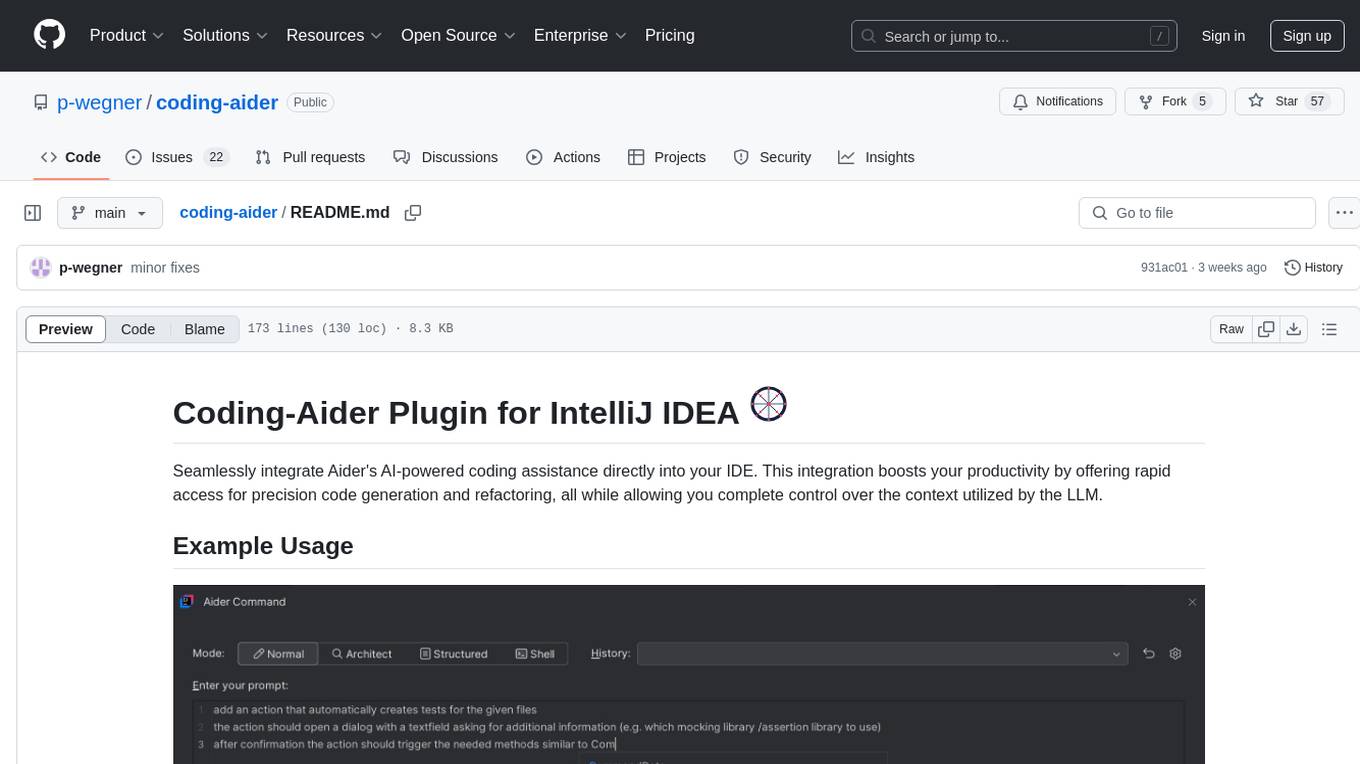
coding-aider
Coding-Aider is a plugin for IntelliJ IDEA that seamlessly integrates Aider's AI-powered coding assistance into the IDE. It boosts productivity by offering rapid access for precision code generation and refactoring, with complete control over the context utilized by the LLM. The plugin provides various features such as AI-powered coding assistance, intuitive access through keyboard shortcuts, persistent file management, dual execution modes, Git integration, real-time progress tracking, multi-file support, web crawling, clipboard image support, and various specialized actions. It also supports structured mode and plans for managing complex features, working directory support, summarized output, and the ability to specify additional arguments for Aider commands. Coding-Aider addresses limitations in existing IntelliJ plugins by offering optimized token usage, a feature-rich terminal interface, a wide range of commands, and robust recovery mechanisms with seamless Git integration.
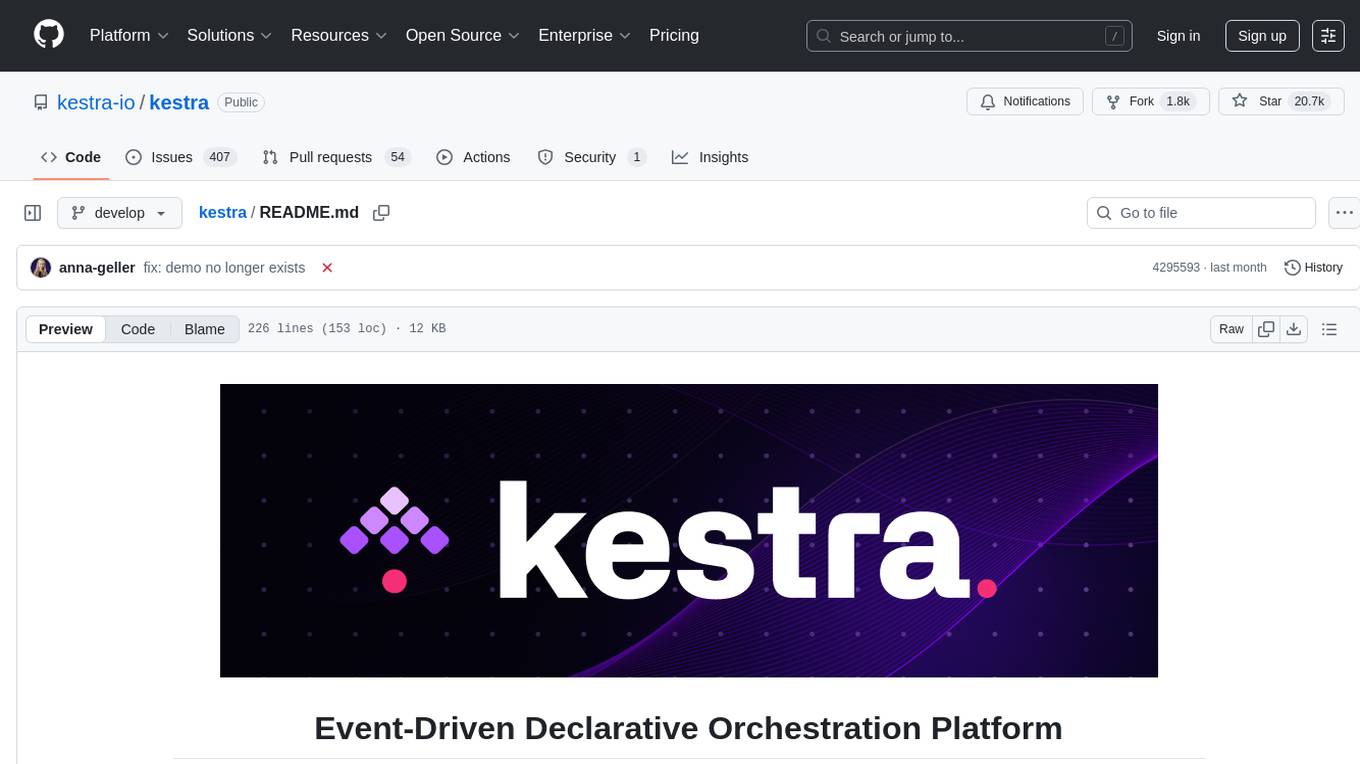
kestra
Kestra is an open-source event-driven orchestration platform that simplifies building scheduled and event-driven workflows. It offers Infrastructure as Code best practices for data, process, and microservice orchestration, allowing users to create reliable workflows using YAML configuration. Key features include everything as code with Git integration, event-driven and scheduled workflows, rich plugin ecosystem for data extraction and script running, intuitive UI with syntax highlighting, scalability for millions of workflows, version control friendly, and various features for structure and resilience. Kestra ensures declarative orchestration logic management even when workflows are modified via UI, API calls, or other methods.
For similar tasks

cline-based-code-generator
HAI Code Generator is a cutting-edge tool designed to simplify and automate task execution while enhancing code generation workflows. Leveraging Specif AI, it streamlines processes like task execution, file identification, and code documentation through intelligent automation and AI-driven capabilities. Built on Cline's powerful foundation for AI-assisted development, HAI Code Generator boosts productivity and precision by automating task execution and integrating file management capabilities. It combines intelligent file indexing, context generation, and LLM-driven automation to minimize manual effort and ensure task accuracy. Perfect for developers and teams aiming to enhance their workflows.
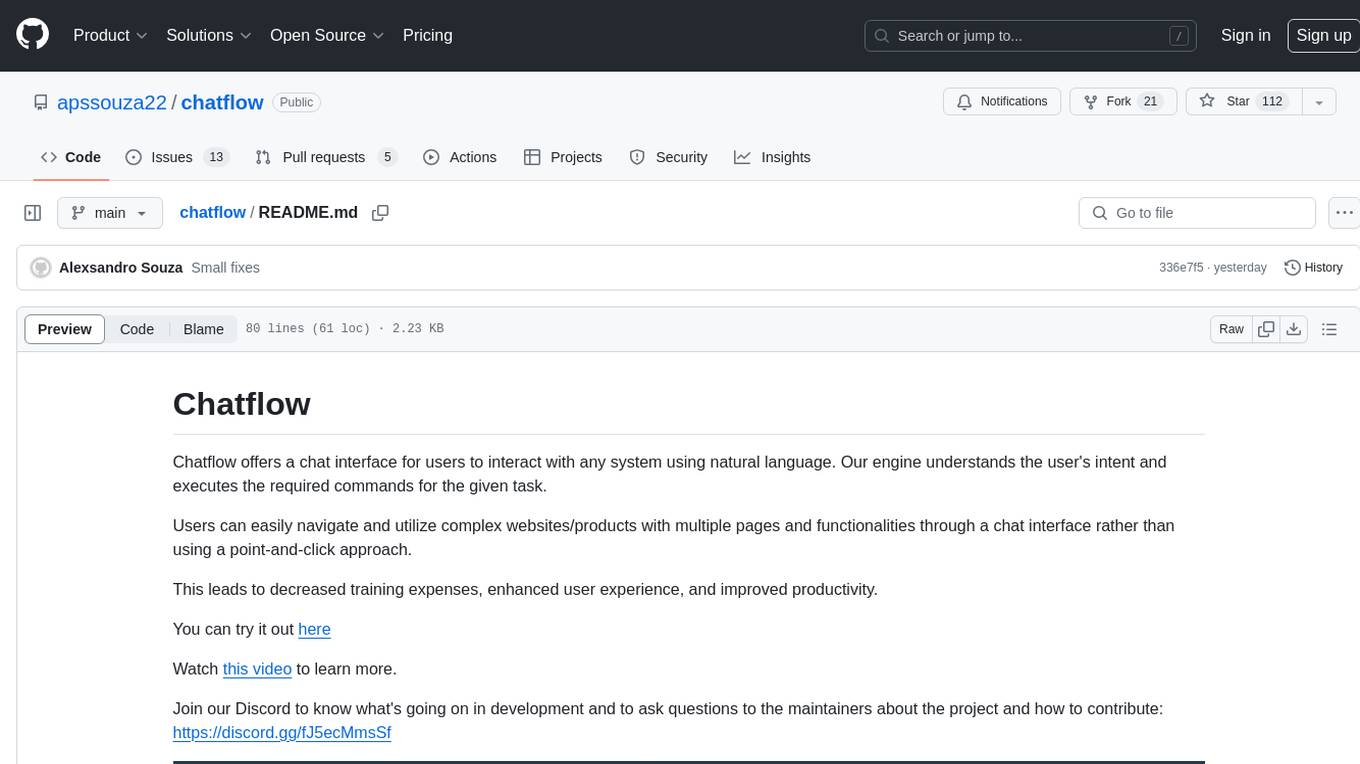
chatflow
Chatflow is a tool that provides a chat interface for users to interact with systems using natural language. The engine understands user intent and executes commands for tasks, allowing easy navigation of complex websites/products. This approach enhances user experience, reduces training costs, and boosts productivity.
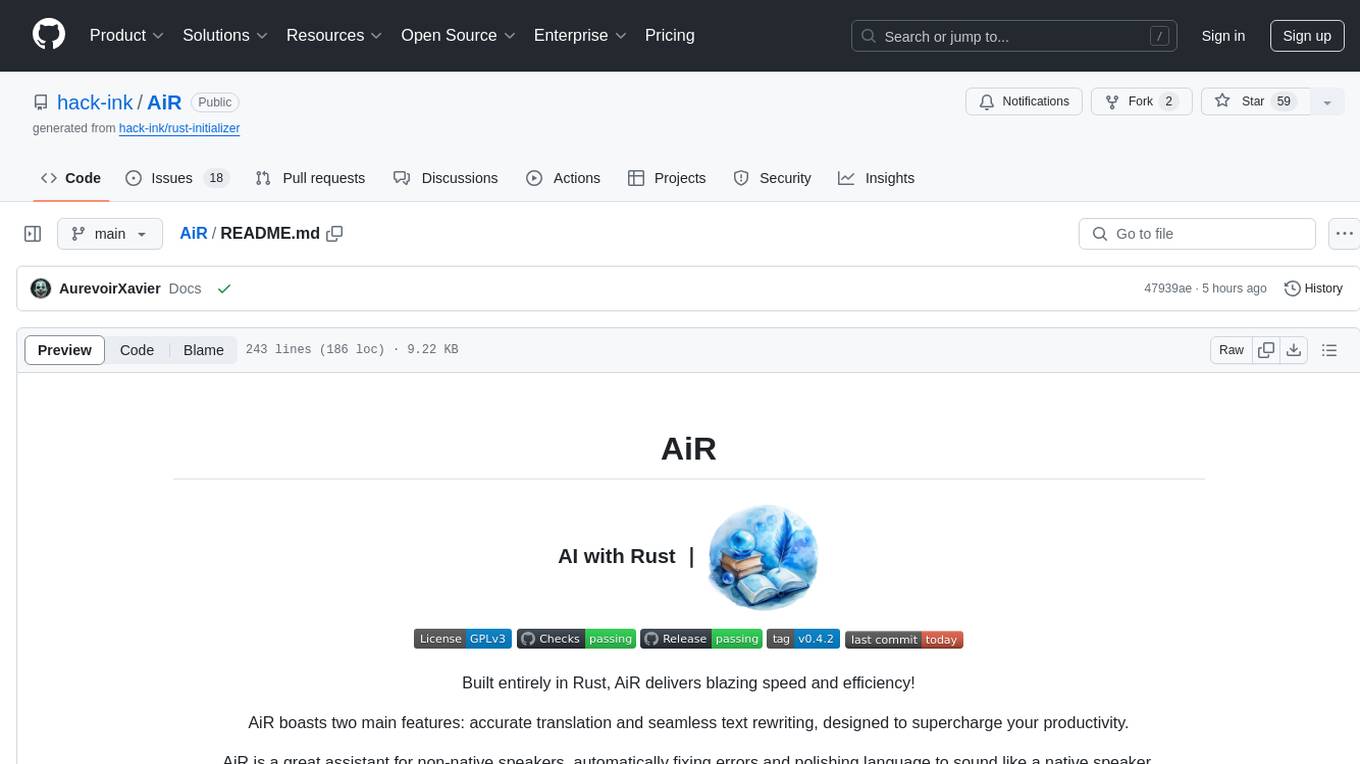
AiR
AiR is an AI tool built entirely in Rust that delivers blazing speed and efficiency. It features accurate translation and seamless text rewriting to supercharge productivity. AiR is designed to assist non-native speakers by automatically fixing errors and polishing language to sound like a native speaker. The tool is under heavy development with more features on the horizon.
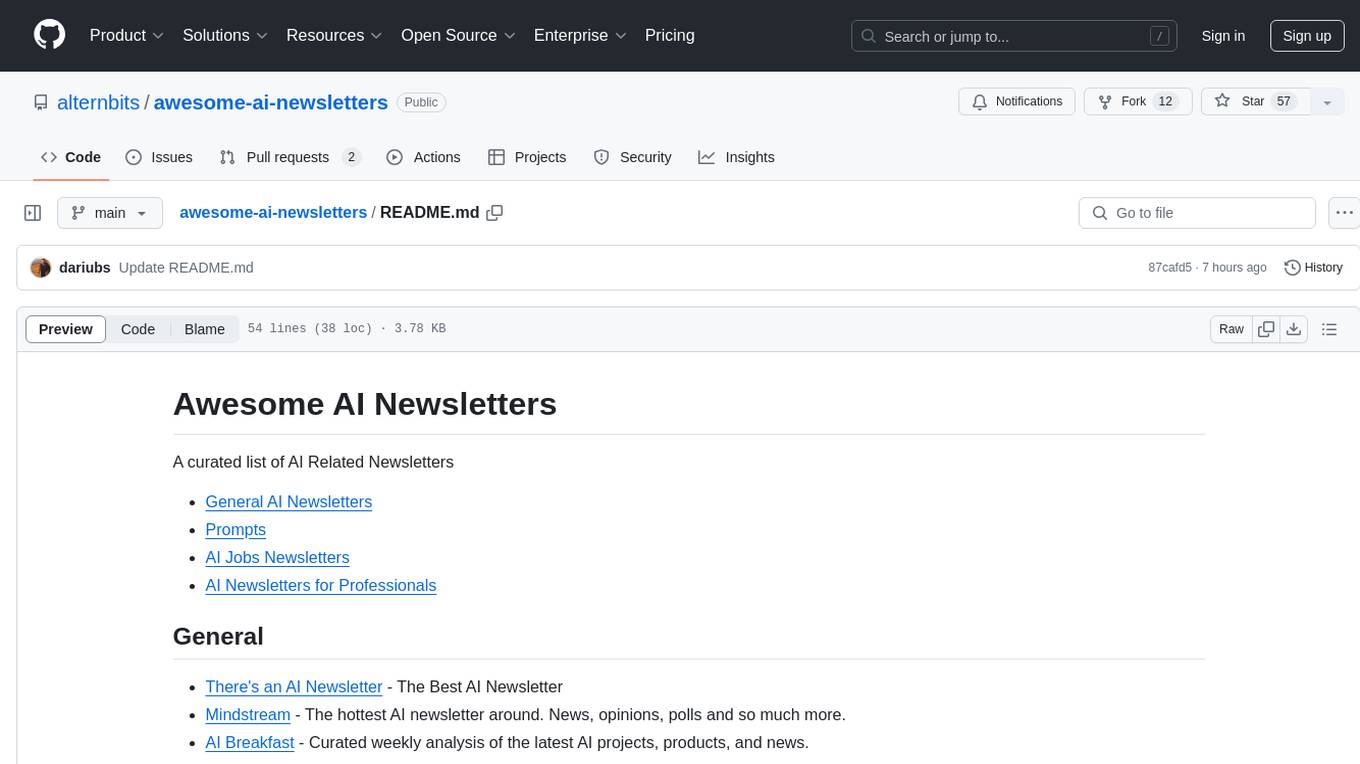
awesome-ai-newsletters
Awesome AI Newsletters is a curated list of AI-related newsletters that provide the latest news, trends, tools, and insights in the field of Artificial Intelligence. It includes a variety of newsletters covering general AI news, prompts for marketing and productivity, AI job opportunities, and newsletters tailored for professionals in the AI industry. Whether you are a beginner looking to stay updated on AI advancements or a professional seeking to enhance your knowledge and skills, this repository offers a collection of valuable resources to help you navigate the world of AI.
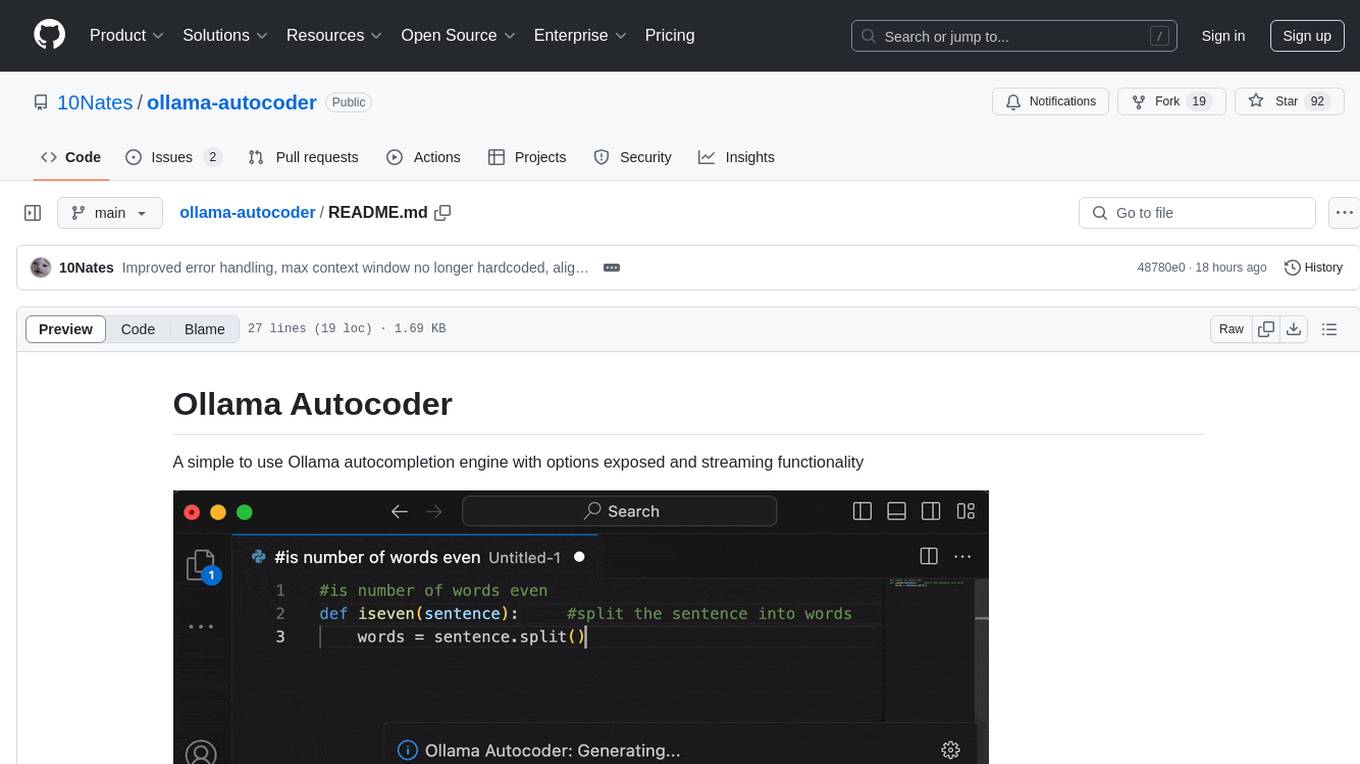
ollama-autocoder
Ollama Autocoder is a simple to use autocompletion engine that integrates with Ollama AI. It provides options for streaming functionality and requires specific settings for optimal performance. Users can easily generate text completions by pressing a key or using a command pallete. The tool is designed to work with Ollama API and a specified model, offering real-time generation of text suggestions.
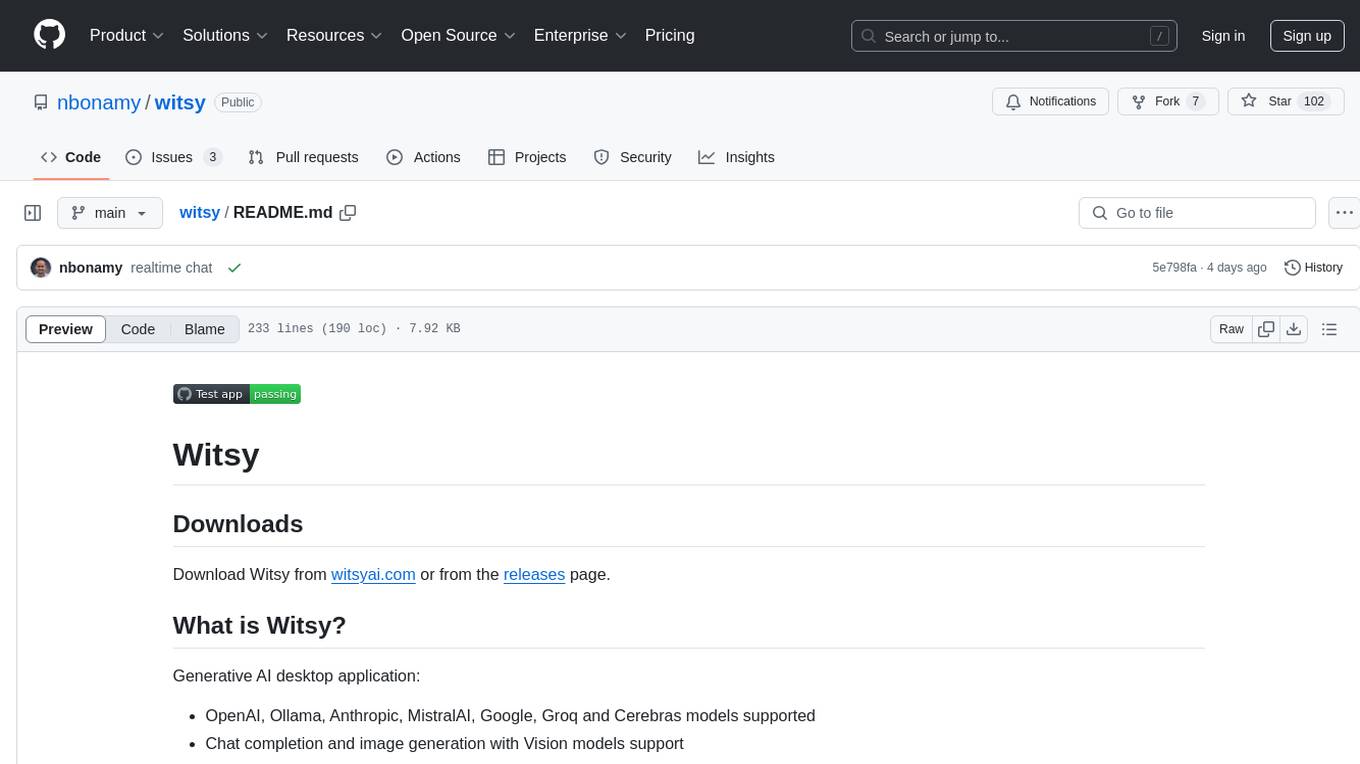
witsy
Witsy is a generative AI desktop application that supports various models like OpenAI, Ollama, Anthropic, MistralAI, Google, Groq, and Cerebras. It offers features such as chat completion, image generation, scratchpad for content creation, prompt anywhere functionality, AI commands for productivity, expert prompts for specialization, LLM plugins for additional functionalities, read aloud capabilities, chat with local files, transcription/dictation, Anthropic Computer Use support, local history of conversations, code formatting, image copy/download, and more. Users can interact with the application to generate content, boost productivity, and perform various AI-related tasks.
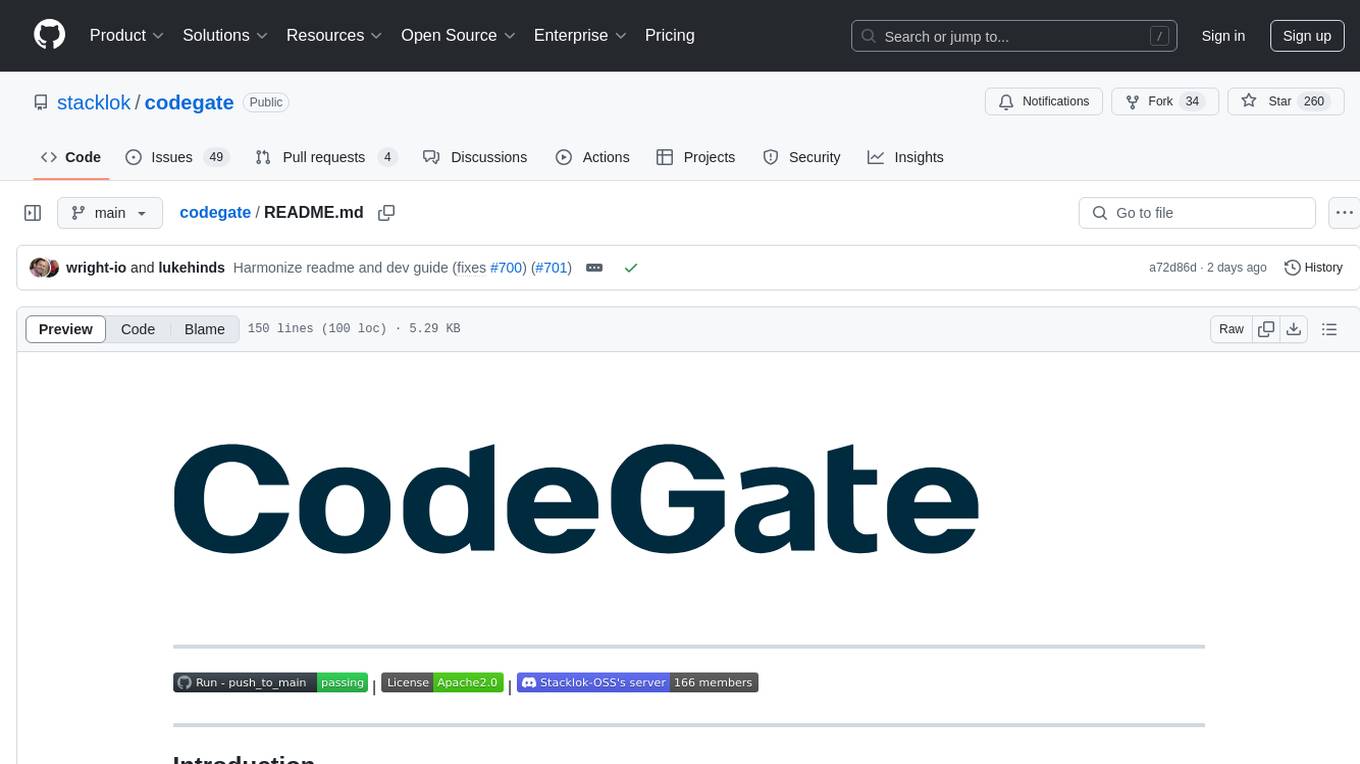
codegate
CodeGate is a local gateway that enhances the safety of AI coding assistants by ensuring AI-generated recommendations adhere to best practices, safeguarding code integrity, and protecting individual privacy. Developed by Stacklok, CodeGate allows users to confidently leverage AI in their development workflow without compromising security or productivity. It works seamlessly with coding assistants, providing real-time security analysis of AI suggestions. CodeGate is designed with privacy at its core, keeping all data on the user's machine and offering complete control over data.
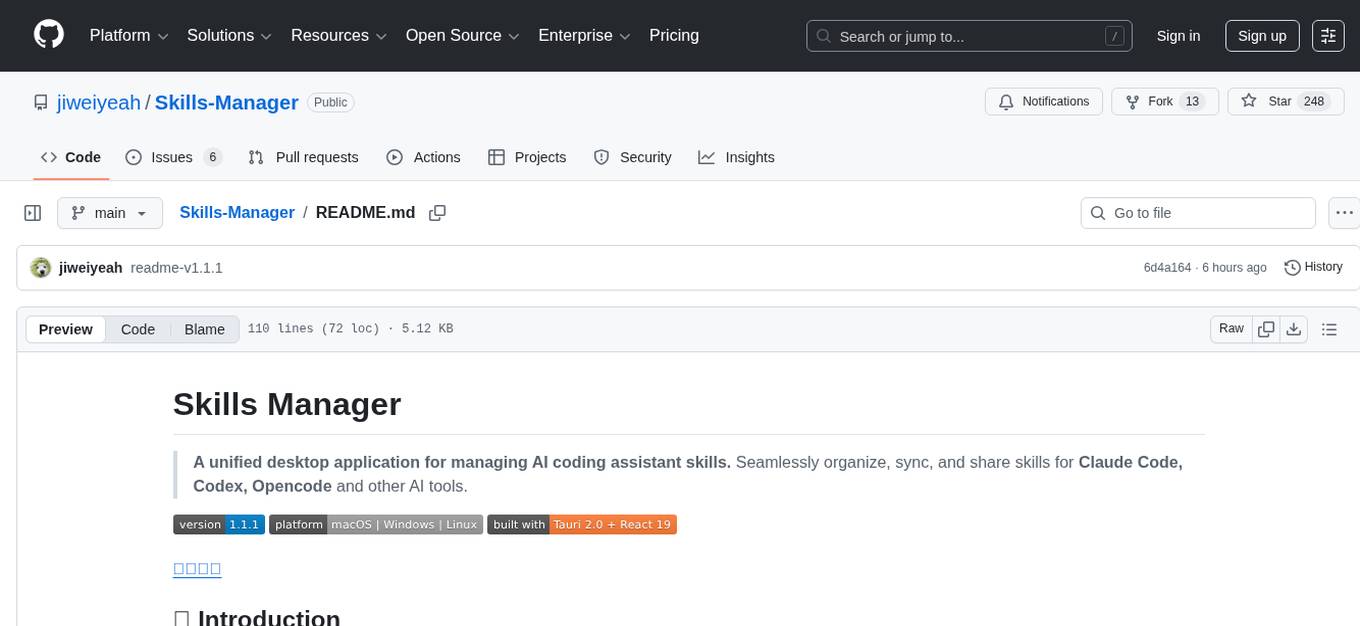
Skills-Manager
Skills Manager is a unified desktop application designed to centralize and manage AI coding assistant skills for tools like Claude Code, Codex, and Opencode. It offers smart synchronization, granular control, high performance, cross-platform support, multi-tool compatibility, custom tools integration, and a modern UI. Users can easily organize, sync, and share their skills across different AI tools, enhancing their coding experience and productivity.
For similar jobs

sweep
Sweep is an AI junior developer that turns bugs and feature requests into code changes. It automatically handles developer experience improvements like adding type hints and improving test coverage.

teams-ai
The Teams AI Library is a software development kit (SDK) that helps developers create bots that can interact with Teams and Microsoft 365 applications. It is built on top of the Bot Framework SDK and simplifies the process of developing bots that interact with Teams' artificial intelligence capabilities. The SDK is available for JavaScript/TypeScript, .NET, and Python.

ai-guide
This guide is dedicated to Large Language Models (LLMs) that you can run on your home computer. It assumes your PC is a lower-end, non-gaming setup.

classifai
Supercharge WordPress Content Workflows and Engagement with Artificial Intelligence. Tap into leading cloud-based services like OpenAI, Microsoft Azure AI, Google Gemini and IBM Watson to augment your WordPress-powered websites. Publish content faster while improving SEO performance and increasing audience engagement. ClassifAI integrates Artificial Intelligence and Machine Learning technologies to lighten your workload and eliminate tedious tasks, giving you more time to create original content that matters.

chatbot-ui
Chatbot UI is an open-source AI chat app that allows users to create and deploy their own AI chatbots. It is easy to use and can be customized to fit any need. Chatbot UI is perfect for businesses, developers, and anyone who wants to create a chatbot.

BricksLLM
BricksLLM is a cloud native AI gateway written in Go. Currently, it provides native support for OpenAI, Anthropic, Azure OpenAI and vLLM. BricksLLM aims to provide enterprise level infrastructure that can power any LLM production use cases. Here are some use cases for BricksLLM: * Set LLM usage limits for users on different pricing tiers * Track LLM usage on a per user and per organization basis * Block or redact requests containing PIIs * Improve LLM reliability with failovers, retries and caching * Distribute API keys with rate limits and cost limits for internal development/production use cases * Distribute API keys with rate limits and cost limits for students

uAgents
uAgents is a Python library developed by Fetch.ai that allows for the creation of autonomous AI agents. These agents can perform various tasks on a schedule or take action on various events. uAgents are easy to create and manage, and they are connected to a fast-growing network of other uAgents. They are also secure, with cryptographically secured messages and wallets.

griptape
Griptape is a modular Python framework for building AI-powered applications that securely connect to your enterprise data and APIs. It offers developers the ability to maintain control and flexibility at every step. Griptape's core components include Structures (Agents, Pipelines, and Workflows), Tasks, Tools, Memory (Conversation Memory, Task Memory, and Meta Memory), Drivers (Prompt and Embedding Drivers, Vector Store Drivers, Image Generation Drivers, Image Query Drivers, SQL Drivers, Web Scraper Drivers, and Conversation Memory Drivers), Engines (Query Engines, Extraction Engines, Summary Engines, Image Generation Engines, and Image Query Engines), and additional components (Rulesets, Loaders, Artifacts, Chunkers, and Tokenizers). Griptape enables developers to create AI-powered applications with ease and efficiency.












